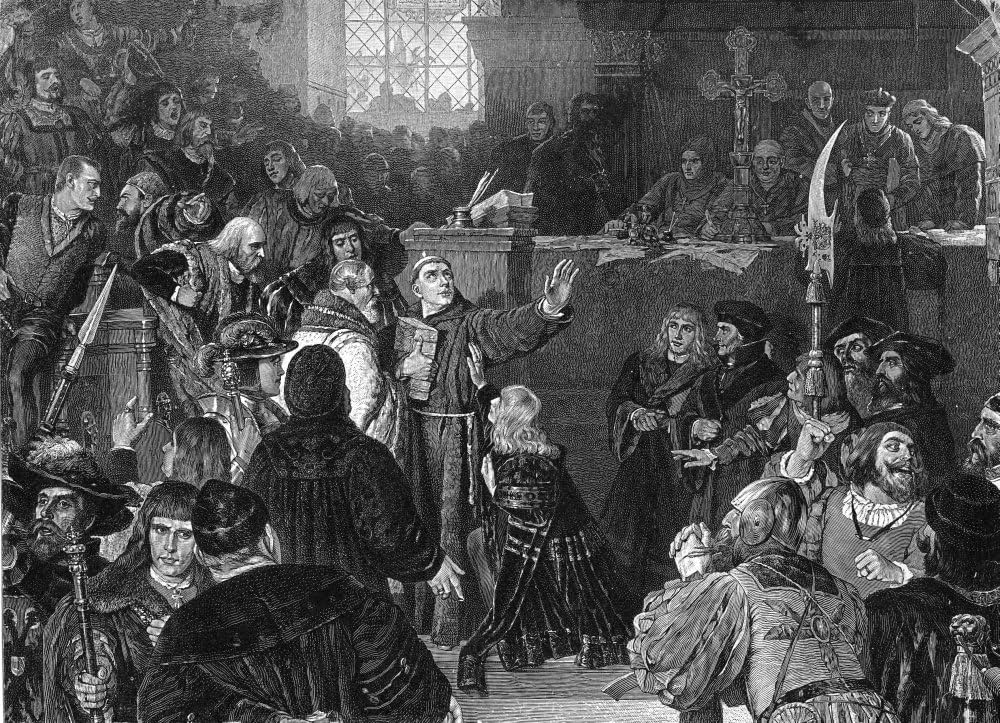The dawn of the 16th century painted a sombre portrait of the Church. Trust, once a given virtue associated with the Church, had withered by the 1500s. Corruption, festering within the very core of the Church, was visible not just in its clergy but was often sanctioned by local rulers who found mutual benefits in the Church’s weakened moral state.
Amid this tumultuous era, Martin Luther was born. His early life was a testament to the theological ambiguities of the time. Luther grappled with the core tenets of salvation, a struggle intensified by the lack of a unified doctrine on salvation and justification within the Church. The prevalent cycle of confession, penance, and Letters of Indulgence designed to offer spiritual redemption, only exacerbated Luther’s spiritual distress. The system, rather than offering solace, seemed to deepen the chasm between the believer and divine assurance.
Luther’s quest for spiritual understanding reached a turning point during an unforgiving thunderstorm. Legend has it that a lightning bolt, narrowly missing him, prompted a vow from Luther to dedicate himself to monastic life. However, the walls of the monastery did little to quell his internal spiritual battles. It was in the pages of the Bible, particularly in the Book of Romans, that Luther found his long-sought answers. The concept of justification through faith alone and in Christ alone became a lighthouse for Luther, illuminating a path out of his spiritual darkness. He realized that salvation was a gift, not earned through rituals but bestowed through the life, death, and resurrection of Jesus.
However, the spiritual decadence of the era soon reared its head again in the form of Johann Tetzel. In 1516, Tetzel, a Dominican friar, embarked on a mission to Germany, peddling indulgences with unmatched zeal. For Luther, Tetzel’s actions symbolized the worst of the Church’s moral decay. Unable to remain silent, Luther penned his Ninety-five theses. What began as an open academic critique in Latin quickly took on a life of its own when translated into German. The dissemination of the theses, facilitated by the invention of the printing press, ignited conversations and debates among scholars, nobles and laymen alike.
These ripples of discontent and the challenges to established ecclesiastical authority eventually culminated in the Protestant Reformation. The seismic shifts in theological thought and church governance that followed would shape the course of Christian history.
Yet, it’s crucial to remember Luther’s core intentions. In the annals of history, it’s easy to portray Luther as a revolutionary, a disruptor of the established order. While some of these titles might fit, at the heart of Luther’s efforts was a simple, profound desire: to elevate the glory of Jesus Christ, to uphold the veracity of Scripture, and to guide souls towards true salvation. His wasn’t a reformation driven by political ambitions or societal upheaval. Martin Luther’s Reformation was, at its core, a reformation of hearts, seeking to bring everyone to this liberating divine truth: our justification is only through faith alone and in Christ alone, “For in it the righteousness of God is revealed from faith for faith, as it is written, ‘The righteous shall live by faith.'” (Romans 1:17)
Luther did not start the Reformation with revolution nor with torches and pitchforks. He started simply by disputing unrighteousness, by upholding the Scripture as the ultimate righteousness. He defied the Pope, the Church, and the government not to be a revolutionary figure towards the authority, but rather to challenge the authority who had strayed away from God.
Then what should we do? Simply to Reform our hearts; to redirect our passion, our goals, and the meaning in our lives back to God. This is also a continuous process, which means we must keep reforming our hearts every time, so our hearts can be aligned to God, not to our sinful flesh.
Reformation is not about an event that only happened in history but about our attitude to be zealous to the Word of God. This zeal is not pictured with fanaticism, but rather our willingness, driven by strong love towards God, to humbly submit and obey to what is commanded to us in the bible. To love God is not accompanied only by a fiery passion, but also by the humility to learn, our devotion in our ministry, our submission to Christ by sanctifying Him in our lives, and by our love for one another as God has commanded us to.
As we reflect on the Reformation that unfolded 506 years ago this October 31st, may this enduring truth serve as an encouragement, reminding us to wholeheartedly place our faith in Christ alone. To God alone be the glory — Soli Deo Gloria.


